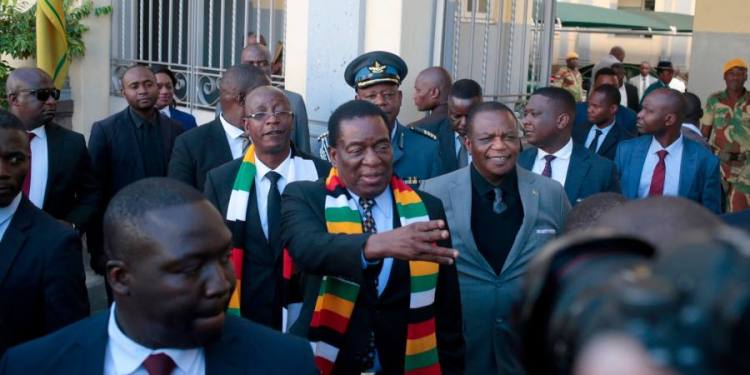Receive free Zimbabwe updates
We’ll send you a myFT Daily Digest email rounding up the latest Zimbabwe news every morning.
Jeffries Ncube looks around Zimbabwe’s second city and fallen industrial heartland and observes that, for all President Emmerson Mnangagwa’s promises to resurrect a ruined economy, many of Bulawayo’s factories have turned into places to pray for the next life, not to profit in this one.
“If you go around the industrial area you notice that several companies have closed down and some are now being used as churches,” said Ncube, 55, who formerly worked at a large garment factory.
Bulawayo used to supply food as far afield as Europe, as its warehouses and railheads knitted Zimbabwe into supply chains across southern Africa. All this was destroyed amid decades of economic chaos under the late Robert Mugabe, with little improvement since Mnangagwa overthrew his former boss six years ago.
As Mnangagwa bids for re-election next month, international judgment on the vote’s fairness will determine whether the one-time spy chief can turn around the economy and reboot the re-engagement that was undermined by his Zanu-PF party’s reversion to violence and corruption during and after the last poll in 2018.
In particular the August 23 vote will be critical to the success of African-led negotiations to end Zimbabwe’s financial isolation and clear decades of unpaid loans that make up the bulk of its $14bn external debt, according to analysts.
“This is one of the clearest and best opportunities that [the regime] have had or they’re likely to get,” said Ringisai Chikohomero, a Zimbabwe-based researcher at the South African Institute for Security Studies.
Mugabe stopped paying the World Bank and others years ago, and there have been many failed endeavours since to clear the debts in return for reforms. Without a deal there are limits on new loans needed to revitalise Zimbabwe and rebuild its foreign reserves, leaving its economy stricken.
Ncube, the former garment factory worker, is just one of countless Zimbabweans now forced to rely on odd jobs and street vending to feed their families.
Yet analysts say this time is different, with the 80-year-old Mnangagwa boxed in by triple-digit inflation and a collapsed currency. Chikohomero said the president had “no strategy but a string of survival tactics that are short-term and immediate.”
Zimbabwe has become an economic basket-case, wracked by shortages, high-level graft by figures linked to Mnangagwa and Zanu-PF and a patronage system based on artificial exchange rates that has wrecked the central bank and the Zimbabwe dollar.
“[Mnangagwa] has failed to arrest corruption which has seen the country losing billions of dollars to inflated prices of goods and services and the smuggling of minerals,” said Farai Muguwu, director of the Harare-based Centre for Natural Resource Governance. He also noted how Zimbabwe used a “surrogate currency that’s not accepted anywhere else in the world and is rejected even by some government agencies.”
One difference now is that the brokers of these talks — African Development Bank president Akinwumi Adesina and Joaquim Chissano, former leader of Mozambique from Zanu-PF’s cousin liberation movement Frelimo — have clout with both the creditors and the ruling party.
Zimbabwe’s neighbours have also become frustrated that Harare has effectively blocked regional hopes for greater integration — enough for them to pressure Zanu-PF to commit to political liberties and compensation for Mugabe-era land seizures, even as they call for rollback of western sanctions on the party’s elite.
Nicole Beardsworth, politics lecturer at Johannesburg’s Wits university, said the “chorus from the continent against sanctions has been almost unanimous,” calling it “perhaps the most successful part of Zimbabwe’s re-engagement drive”.
Yet she also stressed that Mnangagwa had “little interest in reform” at home. Rights groups have condemned his ‘Patriotic Bill’ which they say is the latest attempt to stifle political opposition. The bill, signed last week, threatens the death penalty for anyone “wilfully injuring the sovereignty and national interest of Zimbabwe”.
Yet analysts say that even western governments are likely to set a low bar for what counts as a fair vote next month — although a repeat of the violent crackdowns that marred the 2018 election would not be accepted.
They also note that, despite Zimbabwe’s economic woes, investment has begun to trickle in. Zimbabwe recorded about $150mn of foreign and local investment in the first three months of 2023, according to the country’s investor promotion agency. The list is dominated by Chinese investors and includes the issuance of dozens of licences for lithium mining and exploration.
Mnangagwa this month spoke of the desire to exploit a “favourable business environment for win-win outcomes” as he marked the commissioning of his country’s first China-owned lithium ore processing plant.
Zanu-PF is expected to win next month’s election, although few believe it will offer a true picture of voter sentiment. The party can call upon the powerful state apparatus while the main opposition Citizens Coalition for Change (CCC) has been denied access to mainstream media and its rallies have been banned.
One poll by the country’s Mass Public Opinion Institute indicated 35 per cent support for Zanu-PF and 27 per cent for the CCC, but large numbers of people were also unable to express a preference.
If Zanu-PF did feel the election was slipping away, or if it unexpectedly lost, the party could return to the violence of five years ago, when soldiers shot dead civilian protesters.
Yet Mnangagwa knows that doing so risked closing off the international community, possibly for good. “It remains to be seen if . . . they still have an appetite or desire for reforms,” said Chikohomero.
“How much are they willing to pay to get this re-engagement going?”


![https://primexbt.investments/start_trading/?cxd=459_549985&pid=459&promo=[afp7]&type=IB](https://tradinghow.com/wp-content/uploads/2025/02/primexbt-markets-e1738588646201.jpg)
![https://primexbt.investments/start_trading/?cxd=459_549985&pid=459&promo=[afp7]&type=IB](https://tradinghow.com/wp-content/uploads/2025/02/primexbt-markets.jpg)
![https://primexbt.investments/start_trading/?cxd=459_549985&pid=459&promo=[afp7]&type=IB](https://tradinghow.com/wp-content/uploads/2025/02/PrimeXBT-Trading.jpg)












